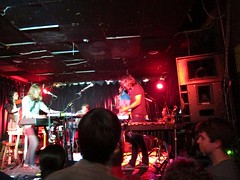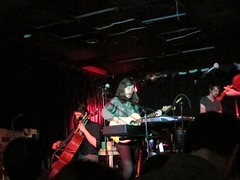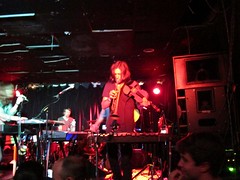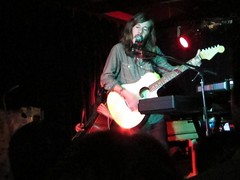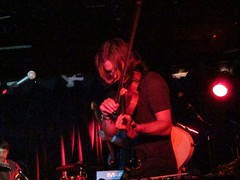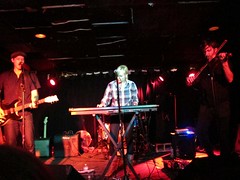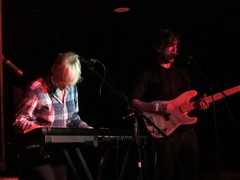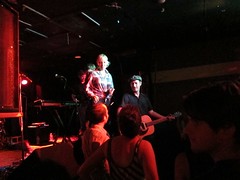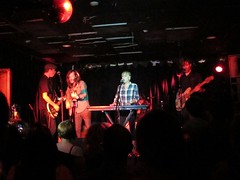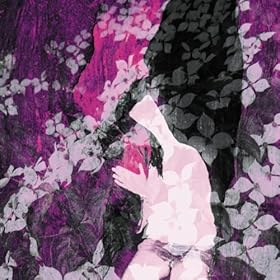Make a joyful noise. The world is full of cheery uplifting tunes. Flip the coin and find a multitude blues and songs full of emo moaning. Something for everyone. Maybe so, but the songs that have made a big impact on me are the dark ones that offer a less comfortable truth.
Not death metal's upside down morality or simplistic punk nihilism...rather a revealing glimpse at a world that isn't perfect. This set of songs have each triggered a recognition in me and changed my view in a way that opened me to the complexity of our real world.
If you share my taste for this kind of darkness, you probably have your own list, but here's mine.
The Velvet Underground - Heroin (The Velvet Underground and Nico)
I remember the first moment I heard this song in a mall record store. I was transfixed by the bare staccato strum of guitar and simple beat, but it was Lou Reed's helpless sense of confusion that connected with my seventeen year old brain:
Yeah, and I guess, that I just don't know.
Listening to the words and realizing that it's a literal love song to heroin was delightfully shocking, but the music added another layer. The song breaths in increasing tempos of tension but always exhales a release. Each wave of the song builds organically until it reaches a frayed rush of jangled noise. The final resolution into the calming fade of mildly distorted guitar is a benediction.
More than just heroin, this is a song about obsession, confusion, brief satisfaction, and constant searching.
David Bowie - Sweet Thing/Candidate (Diamond Dogs)
This is a tightly choreographed section on
Diamond Dogs.
Sweet Thing has a lush, yet detached sound. Bowie stretches out on vocals, going from Thin White Duke to an almost operatic screech. There's an opiated irony in his delivery and the free format between the choruses contributes to the lazy feel. Bowie even gets coquettish:
I'm glad that you're older than me/It makes me feel important and free.
The instrumental end of
Sweet Thing slides into
Candidate without a break. And the mood is shifts casually into tension and threat. The tempo picks up, drops the lushness, and adds more discordant moments. When
Candidate references the same chorus lines, Bowie gives them a smirk. If
Sweet Thing has a golden glow, then this song is cold, weak moonlight.
Neither song succeeds on its own, but together, they form a yin/yang: everything has a dark secret within.
Die Toten Hosen - Böser Wolf (Opium fürs Volk)
I debated including this since it's in German, but it's another song that made a big impression on me. The Toten Hosen came out of the German punk scene but, as this song shows, they've expanded musically quite a bit. True to their anti-establishment roots, the Toten Hosen have never played polite games and ignored uncomfortable truths, both social and political.
Böser Wolf is one of their more controversial songs. The title translates to "Big, Bad Wolf". The music starts with a simple, sweet chiming melody that underlies the entire song. Without listening to the lyrics, the music on the verses is pretty, but wistful. The chorus picks up some low strings and turns threatening. Throughout, Campino's voice effortlessly adds the right tension and sly innuendo.
Even without understanding the words, it's easy to pick up on the mood. The lyrics tell a heartbreaking story of child abuse. Couched in a child's perception, it's not explicit, but it strikes deeper because of that:
She likes to paint pictures of herself and giant men in a dwarf world. She knows stories that she never tells. Most of them she's experienced herself. It's brutally effective because the mild detachment rings all the more true.
Tori Amos - God (Under the Pink)Tori Amos has based an artistic career on confronting a world's injustice and placing it in the context of her own self examination.
God takes her Creator to task for His shortcomings.
God, sometimes you just don't come through.
Complimenting Him on his daisies and calling Him out for the evils in the world, Amos' tone is more condescension than bitterness. On the basis of the lyrics alone, this would merely serve as another atheist's complaint. But the music adds a subtext.
The song is built on a tightly syncopated, funky groove that rolls inexorably forward. At the same time,
God is scattered with jangled, distorted guitars that sound like angry seagulls fighting for scraps. The contrasting parts showcase Amos' own ambivalence. Is she repressing her rage against the unfairness of an aloof God? Is she a little aghast at her own blasphemy? Or is it just the primitive snake brain buried within her psyche?
Umar Bin Hassan - Niggers Are Scared of Revolution (Be Bop or Be Dead)Umar Bin Hassan has been a strong voice in the Last Poets, a band from the late '60s that was one of the roots of hip-hop. Like Gil Scott-Heron, the Last Poets combined poetry, music, and politics to create some great art.
Niggers Are Scared of Revolution was originally released on the Last Poets eponymous first album. I prefer the version Hassan released on his solo album,
Be Bop or Be Dead, in the mid-'90s. His flow is more expressive and it shows that he had not lost his indignation or his oratory abilities.
The song stridently calls out the Black community for getting distracted from political action. Hassan's preaching rhythm and repetition hammer home his point while slipping in sharp observation:
Niggers are actors, ooh niggers are actors
Niggers act like they're in a hurry to catch the first act of the Great White Hope
Niggers try to act like Malcolm did,
But when the White Man doesn't react toward them like he did Malcolm
Niggers won't act violently
Niggers act so cool and slick
Causing white people to say, "what makes them niggers act that way?"
Each verse riffs off a different initial phrase ("niggers are players...", "niggers shoot..."). Hassan's frustration builds, but in the last verse ("niggers are lovers"), he rejects any charge of self-directed race hatred. He loves the sinner but hates the sin.
This song is powerful because it confronts stereotypes and doesn't shy away from ugliness. Hassan's charged language and repetition bounces from cajoling to ranting to resignation, but keeps moving.
Michael Franti - Positive (Live from the Baobab)Live From the Baobab is Michael Franti's live solo album. It covers a fair amount of material he's performed with his band,Spearhead, and offers a more intimate and immediate feel.
Positive originally appeared on the Spearhead album,
Home, but this version is starker.
Raw, spoken word poetry tells the story about a man in love, who's finally decided to get tested for HIV. Franti's flow captures the man's thoughts and experiences as he goes into the clinic and later has to wait for the results. "
But how am I going to live my life if I am positive, is it going to be a negative?"
Worrying over risks taken and the scary implications of a positive result, Franti channels this mindset. Loops of thought circle around, unable to resolve in the waiting. Similarly, the song stays open ended, without the test result to exonerate or castigate the central figure. The lack of sentimentality, preachiness, or judgement keep
Positive from becoming a cheap PSA.
 If Robert Pollard sleeps, he must take catnaps between takes in the studio. This year, Pollard has already released Lord of the Birdcage as a solo album (review here), The New Theory of Everything (with Mars Classroom), Waving at the Astronauts (with LifeGuards), and Space City Kicks (another solo album). Now, he's releasing a double album with Boston Spaceships, Let It Beard.
If Robert Pollard sleeps, he must take catnaps between takes in the studio. This year, Pollard has already released Lord of the Birdcage as a solo album (review here), The New Theory of Everything (with Mars Classroom), Waving at the Astronauts (with LifeGuards), and Space City Kicks (another solo album). Now, he's releasing a double album with Boston Spaceships, Let It Beard.
 It's always a concern when a beloved fringe band makes its deal with the Devil and signs on with a major label. Fans were worried when
It's always a concern when a beloved fringe band makes its deal with the Devil and signs on with a major label. Fans were worried when 



